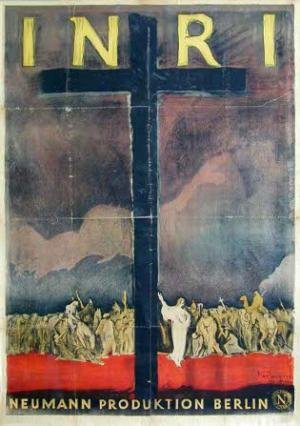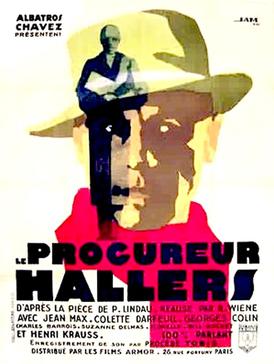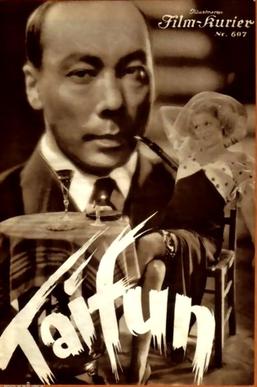Related Research Articles

Robert Wiene was a German film director, screenwriter and producer, active during the silent era. He is widely-known for directing the landmark 1920 film The Cabinet of Dr. Caligari and a succession of other expressionist films. Wiene also directed a variety of other films of varying styles and genres. Following the Nazi rise to power in Germany, Wiene, who was of Jewish descent, fled into exile.
The Queen's Secretary is a 1916 German silent comedy film directed by Robert Wiene and starring Käthe Dorsch, Ressel Orla and Margarete Kupfer. A young Queen secretly marries the commander of her bodyguard, but things are complicated when his ex-lover arrives with a touring opera company. The film was widely praised for its direction, acting and cinematography.
Guido Herzfeld was a German stage and film actor. Herzfeld established himself in the theatre in the nineteenth century. In 1914 he made his film debut and went on to appear in over sixty films before his death.
Lehmann's Honeymoon is a 1916 German silent comedy film directed by Robert Wiene and starring Guido Herzfeld, Christel Lorenz, and Arnold Rieck. In order to persuade a daydreaming Professor of Greek History to marry his cousin, his family dress themselves up as Ancient Greeks.

Arnold Rieck was a German stage and film actor, humorist, and singer.
He This Way, She That Way is a 1915 German silent comedy film directed by Robert Wiene and starring Max Zilzer, Bogia Horska, Otto Treptow and Manny Ziener.
The Canned Bride is a 1915 German silent comedy film directed by Robert Wiene and starring Margarete Kupfer, Senta Söneland and Bogia Horska.
The Doll Maker of Kiang-Ning is a 1923 German silent fantasy film directed by Robert Wiene and starring Werner Krauss, Lia Eibenschütz, and Ossip Runitsch. A doll maker in China crafts a puppet which he is convinced is lifelike. He takes it to exhibit at a public event, but is outraged to find an even more convincing and beautiful doll there. It is in fact a real woman pretending to be a doll, but he becomes so obsessed he attempts to steal her and the film ends with her rescue and his tragic death.
The Woman on the Rack is a 1928 German silent drama film directed by Robert Wiene and starring Lili Damita, Vladimir Gajdarov, and Johannes Riemann. It was also known by the alternative title A Scandal in Paris. It was based on a British play by Edward Hemmerde and Francis Neilson. The wife of a British aristocratic politician, who is neglected by her husband, resists an attempt to break them up. When her husband discovers what he mistakenly believes to be a dalliance with another man he begins divorce proceedings. Eventually the truth comes out and the couple reconcile. The film was not considered one of Wiene's greatest achievements, but he was praised for directing with his usual competence while Damita's performance as Lady Admaston was hailed.

The Famous Woman is a 1927 German silent drama film directed by Robert Wiene and starring Lili Damita, Fred Solm and Warwick Ward. It was based on the play Die Tänzerin by Melchior Lengyel, who also wrote the film's screenplay. While performing in Barcelona, a dancer falls in love with a Spanish aristocrat. He proposes marriage to her providing she give up her profession. She agrees and the wedding preparations begin. When her troupe returns to Spain, however, she is drawn back to her true calling as a dancer and her aristocratic lover reluctantly allows her to go free. Damita's performance was particularly praised, as was the cinematography of Otto Kanturek who had done location shooting in Barcelona.

Leontine's Husbands is a 1928 German silent comedy film directed by Robert Wiene and starring Claire Rommer, Georg Alexander and Carl Walther Meyer. It was based on a play by Alfred Capus. A French dancer works her way through a series of husbands, spending their money. The film received poor reviews from critics, who expected better from the director.

The Great Adventuress is a 1928 German silent comedy film directed by Robert Wiene and starring Lili Damita, Georg Alexander, and Fred Solm. Much of the film's funding came from Britain. Location shooting took place in Paris, Calais and London. The film's plot was criticised by reviews for lacking clarity.

The Night of Queen Isabeau is a 1920 German silent historical drama film directed by Robert Wiene and starring Fern Andra, Fritz Kortner, Hans Heinrich von Twardowski and Elsa Wagner. The film depicts the marriage between the mad Charles VI of France and his wife Queen Isabeau. It was shot at the Babelsberg Studios in Berlin. The film is now considered a lost film, but contemporary reviews praised Wiene's direction. The story revolves around insanity, a common theme in his films.

I.N.R.I. is a 1923 German silent religious epic film directed by Robert Wiene and starring Gregori Chmara, Henny Porten, and Asta Nielsen. The film is a retelling of the events leading up to the crucifixion of Jesus Christ. It was based on a 1905 novel by Peter Rosegger. It was reissued in 1933 in the United States with an added music track and narration as Crown of Thorns.

The Queen of Moulin Rouge is a 1926 Austrian silent comedy film directed by Robert Wiene and starring Mady Christians, André Roanne and Livio Pavanelli. The film is based on the 1902 play La Duchesse des Folies-Bergères by Georges Feydeau. It was the final silent film Wiene made in Austria, before returning to Germany. It was made by the Austrian studio Pan Film, with backing from the French Pathé and German Filmhaus Bruckmann companies.

The Prosecutor Hallers is a 1930 French drama film directed by Robert Wiene and starring Jean-Max, Colette Darfeuil and Suzanne Delmas. It was the French-language version of the German film The Other based on the play Der Andere by Paul Lindau. The two films were made at the same studio in Berlin, with Wiene beginning work on the French version immediately after finishing the German film.

Typhoon is a 1933 German drama film directed by Robert Wiene and starring Liane Haid, Viktor de Kowa and Valéry Inkijinoff. It was based on the 1911 play Typhoon by the Hungarian writer Melchior Lengyel. It was the last German film made by Wiene, who had been a leading director of German silent cinema.

A Night in Venice is a 1934 German-Hungarian operetta film directed by Robert Wiene and starring Tino Pattiera, Tina Eilers and Ludwig Stössel. It is loosely based on the 1883 operetta Eine Nacht in Venedig by Johann Strauss II.

Ultimatum is a 1938 French historical drama film directed by Robert Wiene and Robert Siodmak and starring Dita Parlo, Erich von Stroheim and Abel Jacquin. The film's plot is set in 1914 against the backdrop of the July Crisis between the assassination of Archduke Franz Ferdinand and the beginning of the First World War. It focuses on the relationship between a Serbian officer and his Austrian-born wife and their involvement in espionage between the countries.
Roswolsky's Mistress is a 1921 German silent drama film directed by Felix Basch and starring Asta Nielsen, Paul Wegener, and Wilhelm Diegelmann. It was based on a novel by George Froeschel. The film was shot at the Tempelhof Studios in Berlin, with sets designed by art directors Robert Neppach and Jack Winter. According to one estimate, the star Asta Nielsen wore thirty six different costumes during the course of the film.
References
- ↑ Jung & Schatzberg p.28